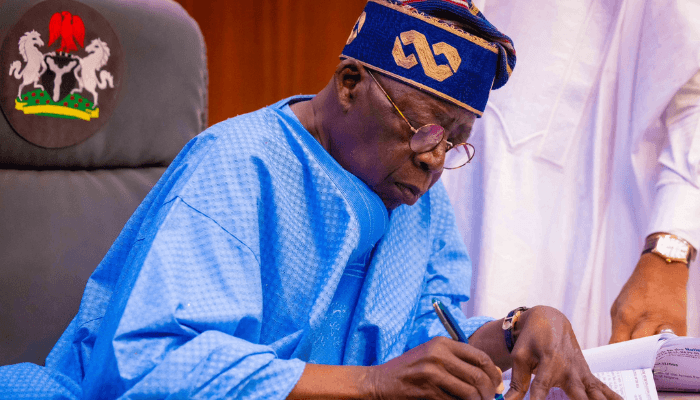Tinubu Requests New Loans Amounting to N7.1 Trillion
President Bola Ahmed Tinubu has formally requested Senate approval for a loan of $8,699,168,559 and €100 million to fund crucial projects nationwide. When combined, these amounts total N7,097,738,729,598.
Senate President Godswill Akpabio read the letter containing the president’s request at the beginning of the plenary on Tuesday.
This new loan application, if approved, will contribute to the national debt, which stood at N87.38 trillion as of June 2023, according to the Debt Management Office (DMO).
The requested $8,699,168,559, when converted at the current exchange rate, is equivalent to N7,009,268,074,728.66, while the €100 million is equal to N88,470,654,870.00.
It is noteworthy that this fresh loan is intended to support critical projects aimed at advancing development across the country.
Upon addition to the current overall public debt of N87.37 trillion, the nation’s debt profile is poised to surpass N94 trillion.
Tinubu, in his letter, clarified that the loan request is part of the federal government’s 2022-2024 external borrowing plan, which had been endorsed by the administration of former President Muhammadu Buhari.
The projects earmarked for financing with this loan span various sectors of the economy and were chosen based on rigorous economic evaluation, considering their anticipated contributions to the country’s overall development.
In the submitted letter, Tinubu stated, “I write in respect of the above subject and to submit the attached federal government 2022-2024 external borrowing plan for consideration and early approval of the National Assembly to ensure prompt implementation of the projects.
The Senate may wish to note that the past administration approved a 2022-2024 borrowing plan by the Federal Executive Council (FEC) held on May 15, 2023.” This emphasizes the continuity of the borrowing plan across administrations.
“The proposed projects span various sectors, placing particular emphasis on infrastructure, agriculture, health, water supply, roads, security, and employment generation, alongside financial management reforms.
As a result, the requested approval totals $8,699,168,559 and €100 million. It is crucial to highlight that the selection of projects in the borrowing plan was informed by rigorous economic evaluations and the anticipated positive impact on the socio-economic development of the country, including job creation and skill acquisition.
Given the urgent need to address the prevailing challenges and restore normalcy to the country, it is imperative for the Senate to deliberate on and approve the 2022-2024 external borrowing plan.
This approval will empower the government to fulfill its responsibilities to the Nigerian people by implementing these crucial projects.”
“To enhance our revenue base as a nation, it is imperative that we explore avenues for expansion. This involves not only increasing the tax capacity of the populace but also stimulating the overall economy. A thriving economy contributes to heightened tax capabilities among the people,” he asserted.
He further advised the government to streamline its expenses by reducing the cost of governance. He emphasized the need for caution, stating, “If Nigerians are tightening their belts and expressing concerns, the government should exercise caution in the type of expenditures it undertakes.”
Adesina Adedayo, a former President of the Chartered Institute of Taxation of Nigeria (CITN), expressed concerns about the additional debt burden on an already heavily taxed citizenry.
He stressed the importance of considering the purpose and utilization of the debt, emphasizing that while some debts may be deemed necessary, others might prove detrimental to the economy.
“If these debts are utilized for developmental projects, the returns on investment would likely manifest in the near future.
However, a significant portion of the debts incurred historically, as well as those presently being accrued, lack the potential for prompt repayment. This situation places an additional burden on an already heavily taxed citizenry.
Given the prevalent unemployment issue in our country, a considerable portion of our populace is not engaged in gainful employment, resulting in low productivity capacity.
Consequently, our ability to effectively service these debts becomes strained, posing a significant challenge. While there is ongoing discourse about accumulating more debt to enhance our external appearance, the reality is that we are not operating as a productive economy.
In essence, our current approach to debt incurrence is burdensome as it does not align with utilizing funds for projects that could positively impact our economy. This is my perspective on the matter.”
“They should steer clear of expenditures resembling a supplementary budget.”
Dr. Ibrahim Aliyu, employed at a prominent first-generation bank, emphasized the necessity for the president and his team to refrain from allocating borrowed funds to non-essential projects.
He expressed reservations about the recent supplementary budget presented to the National Assembly, citing concerns over allocations for a yacht and luxury vehicles for the president’s wife, among other items.
Dr. Aliyu stressed that these expenditures are not a priority for a nation grappling with a heavy debt burden while a significant portion of its population faces hunger.
It is noteworthy that the federal government had introduced a supplementary budget totaling N2.17 trillion, which included allocations of N5 billion each for a presidential yacht and the Education Loan Fund.
The latter was earmarked as part of the implementation of the Higher Education Access Act, 2023, also known as the Students Loan Act.
Additionally, N28 billion was designated for the purchase of luxury cars for the president and the first lady, along with renovations for the president’s residence and other expenses related to the State House.
